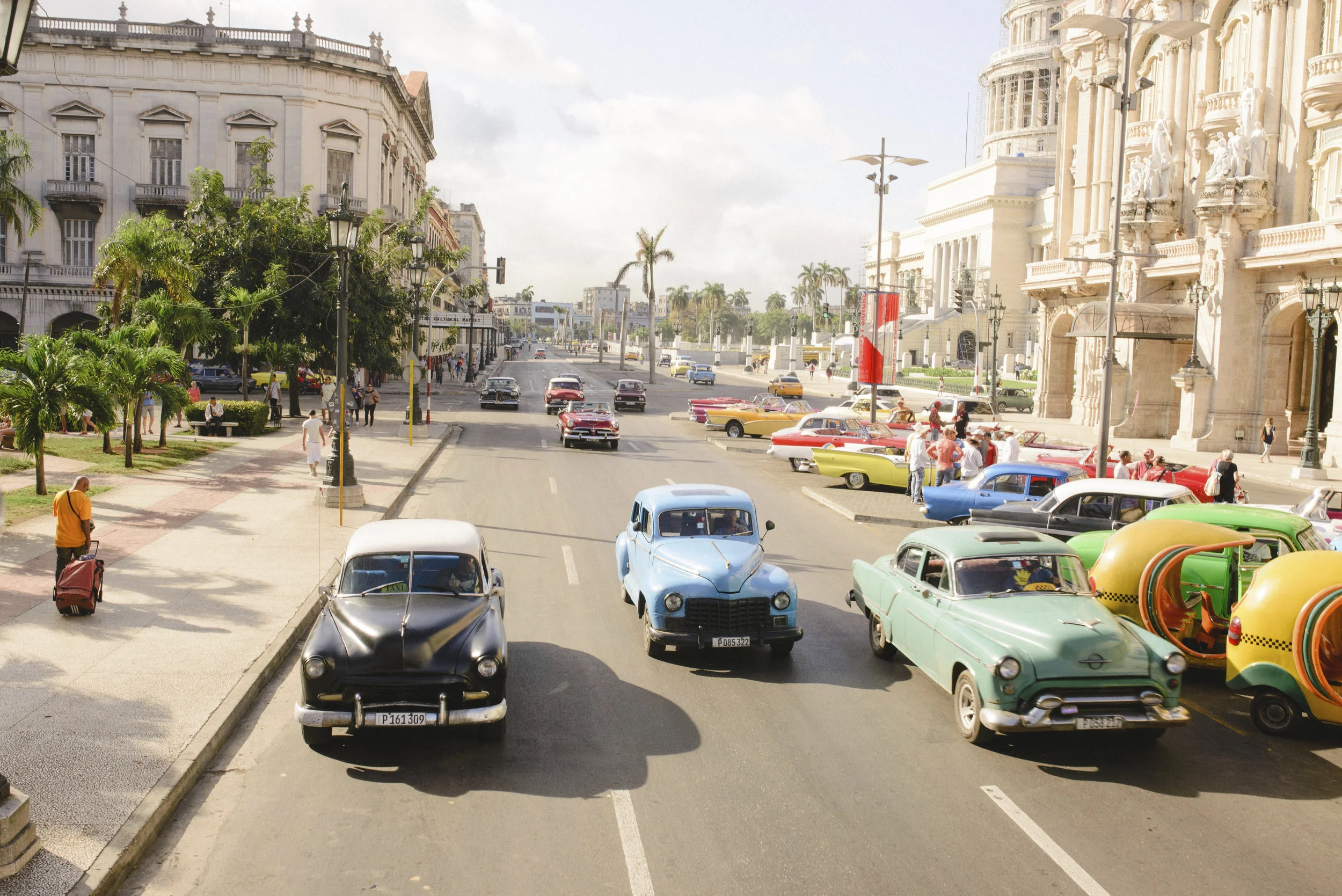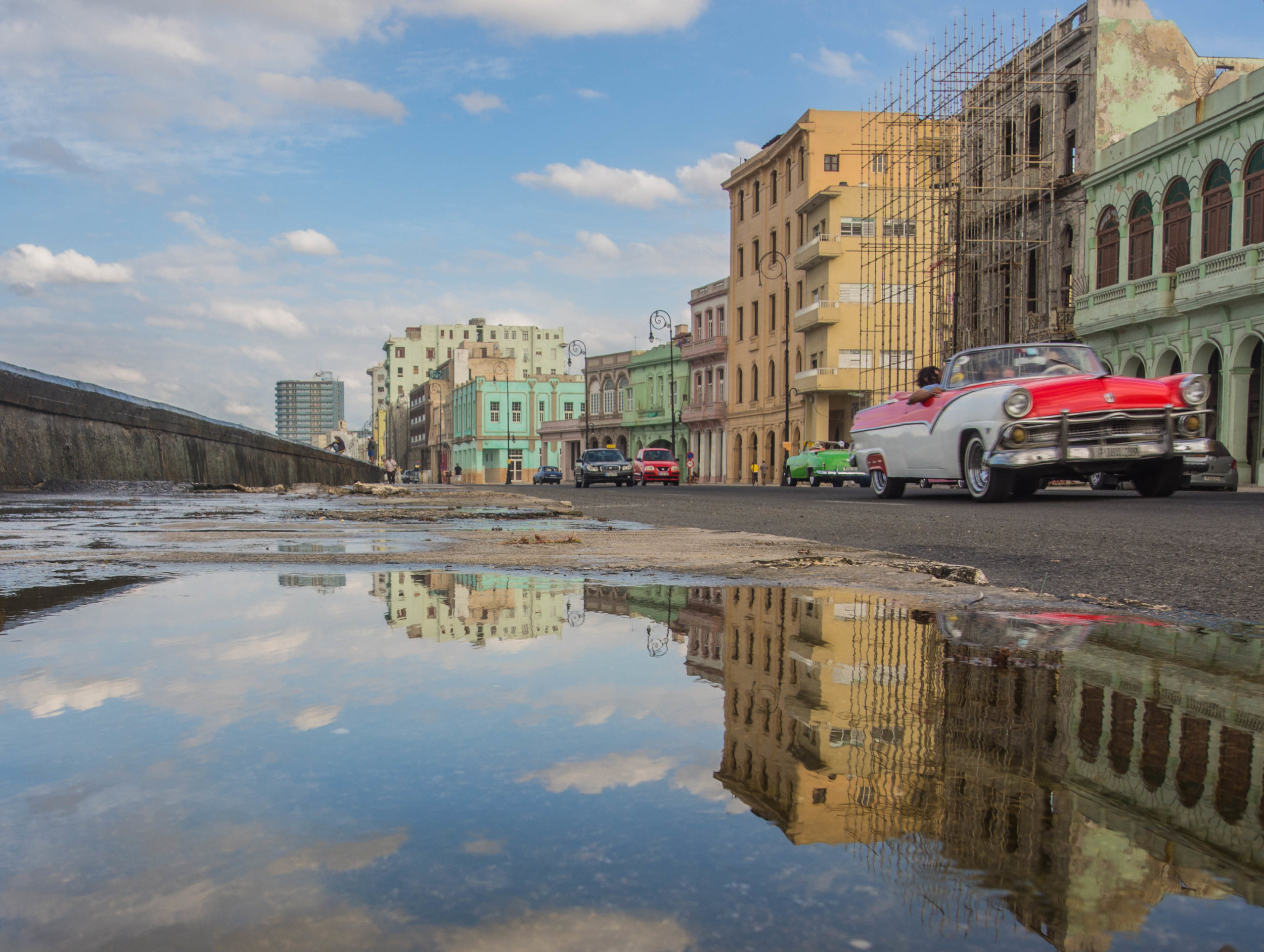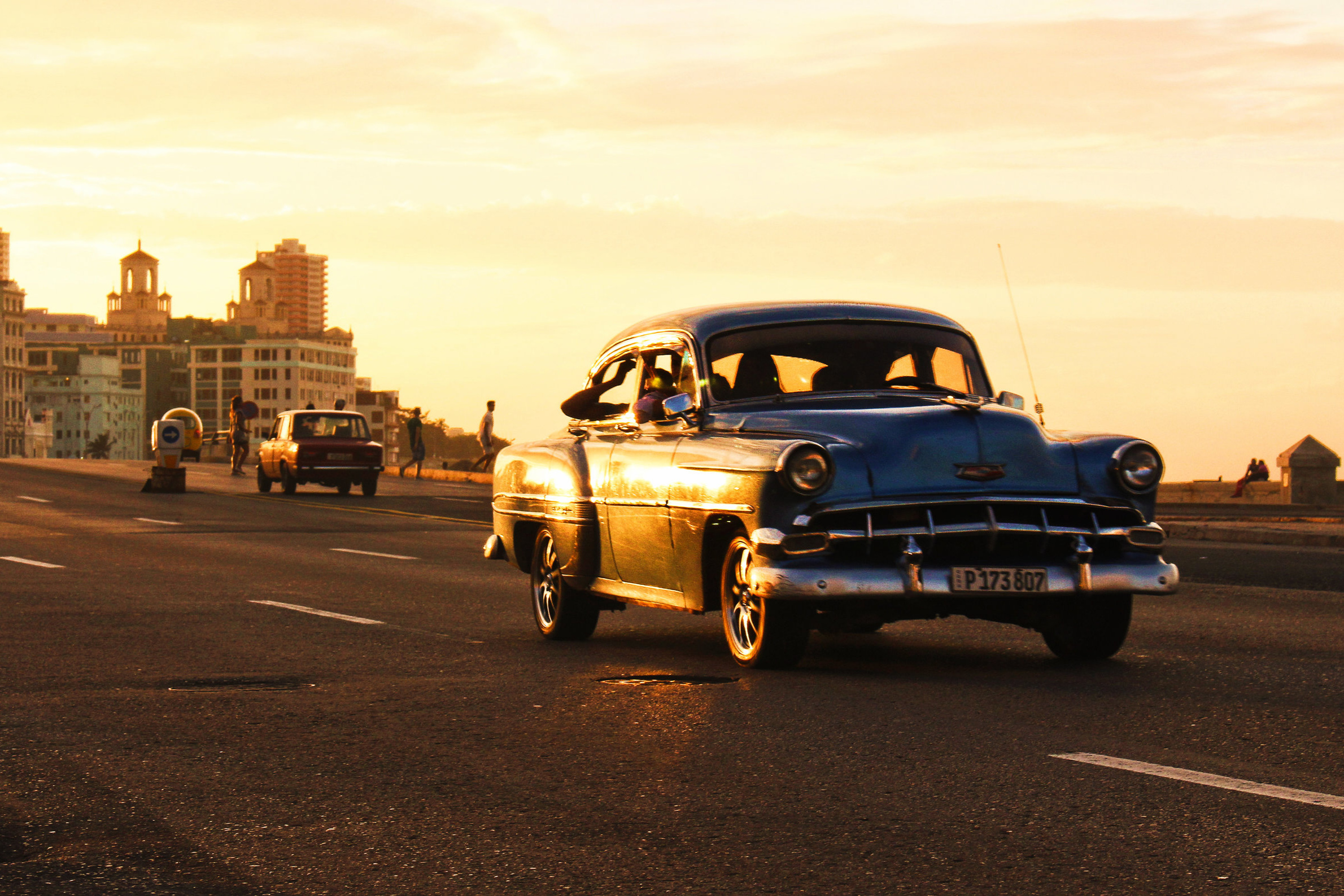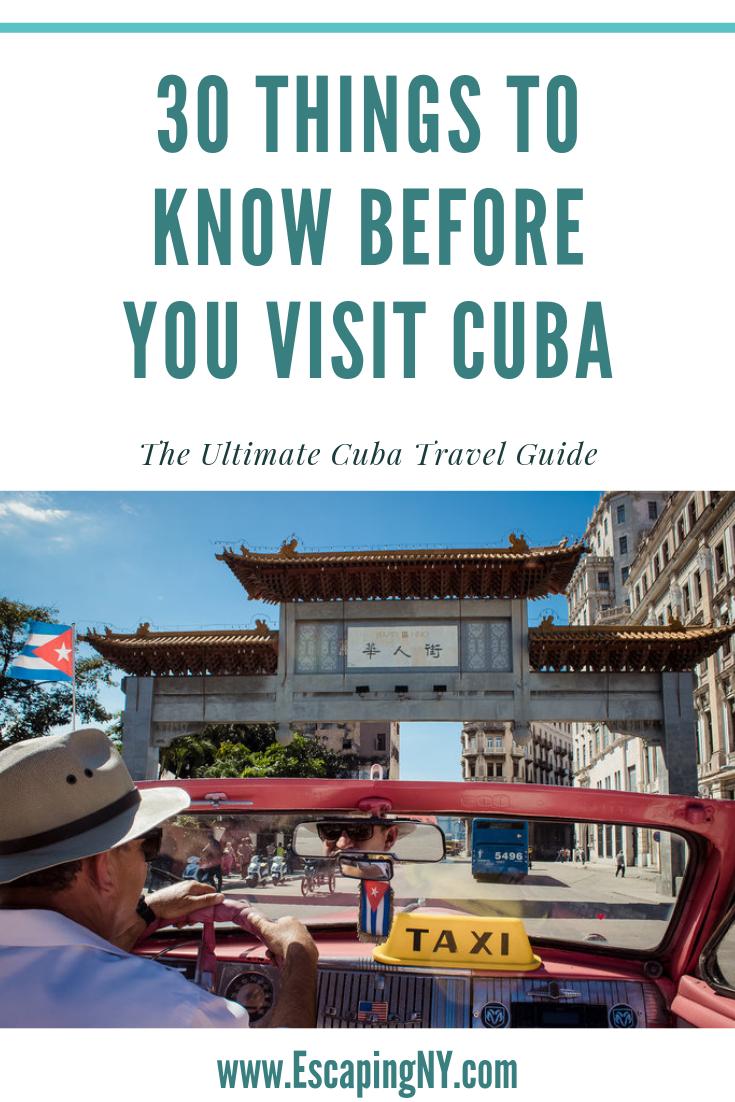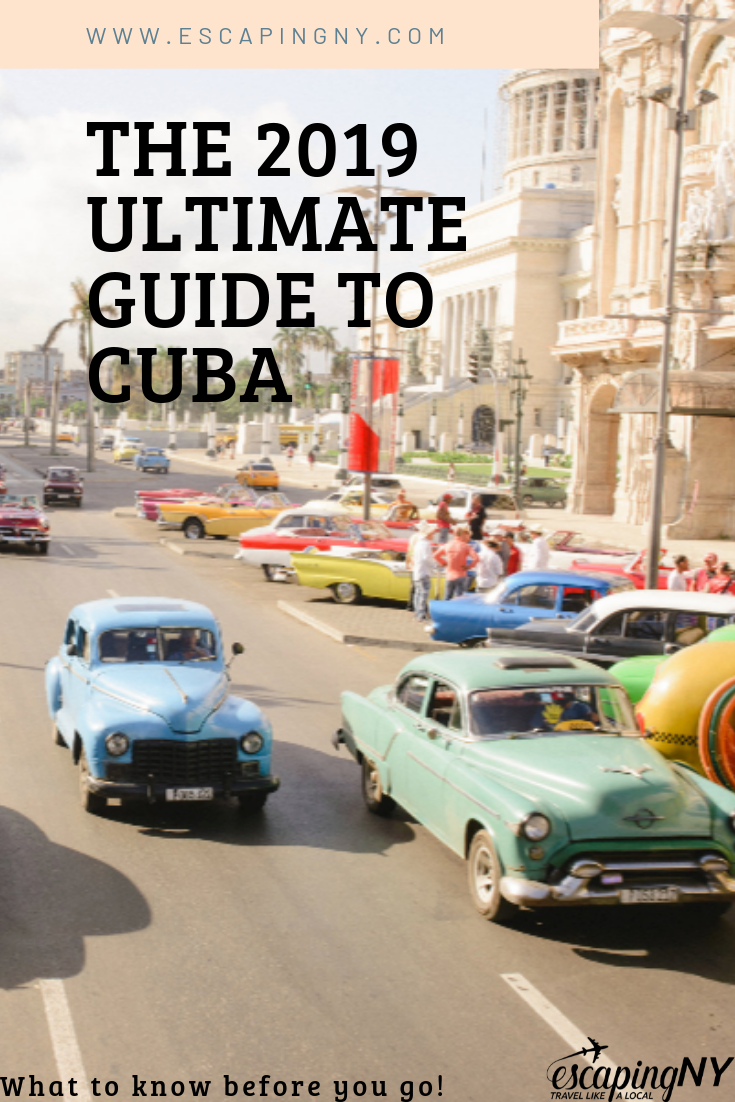The Ultimate Cuba Travel Guide: 30 Things to Know BEFORE You Go 2020
Cuba’s iconic classic cars in Old Havana
What to Know Before Visiting Cuba
Traveling to Cuba for the first time? Read on for everything you need to know before visiting Cuba.
This magical island has been intriguing globe trotters for decades and continues to be at the top of “must visit” bucket lists of travelers across the world. It’s a gorgeous, lively, diverse, fascinating country but there are definitely some things to know before going to Cuba.
Get this free Cuba travel itinerary to help plan your vacation and/or contact me to set up a personal travel consultation to make your dream trip a reality!
1. Cuba is Not the Easiest Place to Travel
Internet access is unreliable, credit cards aren’t accepted, a dual-currency system is in place, street scams abound, the iconic classic cars break down frequently, and the transportation system is confusing. Add to this a lack of clarity on just about everything, as written policy, schedules, and details are usually non-existent so employees and locals often give conflicting information. Cuba is not the easiest place to travel.
Travel through Cuba is possible and can be absolutely fantastic, just approach your trip knowing that more planning is required than usual and that it’s very possible that things may go differently than planned so you’ll have to adjust. If you’d like help pre-planning your trip to minimize potential challenges, please contact me.
2. Cuba is a Safe Country
Cuba is an extraordinarily safe country and the risk of being physically attacked is very low. In general, Cuba is very safe, including for solo female travelers. Petty theft does occur, particularly in crowded tourist areas so exercise the same caution you would in any other country: only carry as much cash as you need that day, keep your wallet/purse close to you, and only take trusted taxis (especially if you’ve enjoyed one too many mojitos!)
3. The Internet may not work
Internet access does exist and WiFi access in Cuba has dramatically improved in recent years, but it’s still not nearly as widespread or reliable as it is in most countries. Scratch-off Internet cards are required to connect to WiFi and are usually sold in hourly increments. Most Cubans and tourists connect to the Internet at hotels and public WiFi hot spots, though an increasing number of Cuban casas particulares boast their own WiFi connection.
Many travelers enjoy spur of the moment travel – looking up activities for that day, checking restaurant and tour reviews, researching spontaneous day trips, swapping out plans due to bad weather, etc. Given the poor WiFi access, this is very difficult to do in Cuba so a lot of pre-planning is required.
Additionally, many phone apps can’t be downloaded in Cuba but will work if you download them in advance, though some functions may not work at all. Learn more in this blog post on 25 Things to Know About WiFi Access in Cuba.
A musician in Old Havana
“EscapingNY provided an extremely useful, very personalized service, matching us with a documentary film maker who served as an air traffic controller with an opinion. EscapingNY made this a very interesting travel experience and Cassandra’s recommendations found us in very nice places with people she personally had vetted. You can’t go wrong with EscapingNY!”
Vinales Valley, tobacco country
“EscapingNY planned a week-long girls getaway to Cuba. It helped so much knowing exactly where we were going and that we were getting there with trusted people. All the casa owners were wonderful and our taxi driver gave us a fantastic experience, full of information about each area we visited. He really looked out for us like a dad, and we were so sad to say goodbye to him!”
4. Cash is King
Though some establishments do accept credit cards (mostly large resorts), it’s still very uncommon. Also note that even if credit cards are generally accepted somewhere, US-issued cards will not be accepted. ATM machines do exist but will not accept US-issued bank cards. As such, bring all the cash with you that you expect to need during your trip. Though US dollars can be exchanged in Cuba, they are hit with a 10% penalty fee so many Americans opt to exchange their US dollars for Canadian dollars or Euros prior to arriving in Cuba.
5. How to Exchange Money in Cuba
Only exchange money at reputable hotels, banks, and money exchanges, called CaDeCas (short for “Casas de Cambio”). Do NOT exchange money on the street. Taxi drivers, hosts, tour guides, and random people will likely offer to exchange your money for a better exchange rate than banks and CaDeCas can offer but you run the risk of being given counterfeit bills.
6. Understanding the CUC vs CUP
There are currently two types of currency in Cuba, the Convertible Peso (CUC) and the Cuban Peso (CUP). The colorful CUC, also known as divisa, is roughly pegged to the US dollar and is what most tourists use in Cuba to pay for hotels, casas particulares, taxis, and restaurant meals. The CUP, also known as moneda nacional, is worth just 1/24th of the CUC, and is what Cubans use in their everyday lives to pay their utility bills and buy produce at farmers’ markets.
The best way to distinguish between the two currencies is to look at the main marking on the bill. CUC (divisa) display monuments and statues while CUP (moneda nacional) display the faces of revolutionary heroes like Camilo Cienfuegos and Che Guevara.
Most tourists get by just fine only using CUCs but if you plan on taking Cuban colectivos (shared transportation), eating at cheap restaurants patronized by Cubans, or traveling to non-touristy cities, be sure to carry some CUPs.
One of Cuba’s iconic classic cars
Classic cars waiting for business
7. Leaving Cuba with Money
It is prohibited to leave Cuba with any Cuban money. Many travelers save some CUCs to spend on rum, cigars, and other souvenirs at the airport, but some travelers have been apprehended (and nearly missed their flight!) for attempting to leave the country with CUCs.
Leaving Cuba with more than US$5,000 is also prohibited. If you arrive in Cuba with such a large amount of cash, it’s essential that you record the cash on a customs declaration form when you arrive to Cuba. You will then be able to leave Cuba with as much cash as you declared upon entry.
8. Pack Everything You’ll Need During Your Trip
Many “everyday items” are simply not available in Cuba so bring everything you think you can’t live without during your trip. This is especially true for medication and toiletries. Properly packing for your visit to Cuba makes a huge difference in how much you'll enjoy the trip. Learn more in this blog post on How to Pack for Cuba.
For a list of all my favorite travel products, including everything I pack for a trip to Cuba, head to my Travel Store, or find neat packing lists in my Amazon.com Store.
9. Pack Light
I realize this suggestion seems to contradict the last tip of “pack everything you’ll need” but it doesn’t. Bring all the medication and toiletries you’ll need but DON’T bring 5 pairs of shoes and 3 gigantic sun hats. Checked baggage can be notoriously delayed in Cuba (fitting everything into your carry-on is best), and the cobblestone streets, narrow doorways, and walk-up accommodations don’t lend themselves to large, heavy suitcases.
10. Visas and Passports
A valid passport is required to enter Cuba.
All travelers are required to have a tourist card / visa, which can either be obtained from your airline or the travel agency you purchased your trip from. Guard this tourist card/visa safely since it’s required to exit the country. Per recently tightened travel restrictions, Americans will need to chose from one of 12 visa categories. Learn more in this blog post on How Americans Can Travel to Cuba Legally.
Reflection on Havana’s classic malecon
Havana’s malecon at night
“EscapingNY organized a fantastic itinerary for our family of 5 that included excellent lodgings, meals, and activities. We had so much fun in Cuba! Knowing that a professional was handling all the details and checking in with us and our hosts and drivers throughout the trip allowed for a more relaxed trip and gave us piece of mind as parents.”
“EscapingNY helped me plan my own solo trip to Cuba, providing great tips for staying within my budget, and narrowing down the worthwhile places to visit based on my interests. As a result, I felt a lot more confident traveling alone and had a successful trip because of it. I recommend EscapingNY to anyone needing a trustworthy guide outside of a travel book.”
11. Health Insurance is Required
Proof of health insurance is required to enter Cuba. Airport officials occasionally spot check for proof of insurance and if you can’t provide documentation, you’ll be required to purchase it on the spot.
Note that all American airlines include the required health insurance within the price of the airfare. Save your boarding pass as proof of health insurance, as you will be asked to provide it at the hospital should you need to seek treatment. This insurance is good for 30 days so if you plan to be there longer, you’ll be required to purchase a separate policy. I always purchase World Nomads travel insurance and recommend it to all my clients. It includes the required health insurance and also protection against theft, loss, delayed flights, and health/emergency-related cancellations. Learn more here about Why You Should Purchase Health Insurance.
12. Casas Particulares vs Hotels
Casas particulares are private homes where families rent individual rooms or entire apartments as bed and breakfast-style accommodations. Casas particulares typically offer best value in terms of quality and service. Licensed casas particulares will display a blue anchor-like symbol outside their home that may say “divisa”, which refers to the CUC (Cuban peso). Red anchors indicate that the home is only licensed to host Cubans, who will pay in “moneda nacional” (CUP).
Hotels in Cuba range from budget to luxury, including 5-star hotels, though one or two stars should be deducted for the rating to approximate international standards. All-inclusive beachfront hotels are popular with tourists but they often don’t allow travelers to meet a lot of everyday Cubans or learn about the culture. Some hotels can be reserved online and paid for with credit card, though most are off-limits to Americans (who can’t pay with their credit card anyway), so I tend to suggest casas particulares.
13. What to Know About AirBnB in Cuba
AirBnB has been operating in Cuba since 2016 and for many travelers, it’s an easy way to find accommodations, from bargain bungalows to luxurious villas. Users can pay in advance using their credit card, eliminating the need to bring extra cash to Cuba (a particular challenge for Americans). New AirBnB users can take advantage of my $40 discount code and anyone can find some of my favorite AirBnBs in Cuba here!
Note that there are many significant challenges to using AirBnB in Cuba. The AirBnB app doesn’t work properly in Cuba so new reservations can’t be made from within Cuba and the map feature is often wrong. Many accounts are managed by people who live in other countries and amenities listed tend to be exaggerated so there is often miscommunication and expectations do not always meet reality. Learn more in this blog post on What to Know Before Booking an AirBnB in Cuba.
AirBnB poses unique challenges in Cuba
Rolling through Havana’s Chinatown
14. Jineteros: Cuba’s street hustlers
Jineteros are street hustlers/touts known to prey on tourists. Jineteros are best identified calling to foreigners with the tried-and-true “Where you from?" or offering to help them find a taxi, hotel, nightclub, souvenir, restaurant, cigars (counterfeit), etc. Most jineteros are friendly and harmless but their persistence can be very annoying. Many have no formal job and rely on tourists to buy their food and drinks and pay their admission to clubs. If you feel you’ve made a friend and you want to buy them dinner, there’s nothing wrong with that, I do the same! Just know that quite a few travelers find themselves spending far more money than intended, only to feel taken advantage of afterward.
15. Warning to Women: Expect Catcalling
Though Cuba is a very safe country, catcalling is exceedingly common. Cuban and foreign women all receive catcalls, whistling, and kissing noises - regardless of their outfit. It’s pretty much impossible to go a day without someone calling you “linda” (beautiful). If you’re looking for a boyfriend, you’ll LOVE Cuba (though your new beau may just be looking for money). Unfortunately, the only way I’ve found to avoid it altogether is to be accompanied by a man. Learn more in my blog post on Tips for Solo Female Travelers to Cuba.
16. Transportation in Cuba
Tour Buses
Cuba’s state-owned, air-conditioned tour bus fleet, Viazul, is the most reliable form of transportation in Cuba to travel between cities and provinces (think Havana to Vinales, Trinidad to Holguin, Santiago to Guantanamo, etc.) Also note there is a Cuban-only bus system that’s off-limits to tourists. If the Viazul route is full (and it often is during peak periods), you’re not allowed to ride on the Cuban buses. In some cities (such as Havana), the Cuban and tourist buses are at different terminals.
Private Taxis
Within most cities, private taxis are the easiest way to get around. Like in any country, foreigners are often over-charged, but travelers accustomed to paying for taxis in Europe, the US, or Canada, will still find the rates very reasonable. Taxis can be hailed on the street or found in front of major hotels, public plazas, parks, and popular meeting places. Official taxis can either be traditional yellow cabs or Cuba’s quintessential classic cars. Bicycle taxis, or bicitaxis, are also extremely common and are usually safe (if you feel your driver is reckless, get out!)
Colectivos
Colectivos are shared taxis, also known as “maquinas” (machines) or “almendrones”. These American classic cars shuttle people along a set route, both within and between cities across the island. They can be very confusing for inexperienced travelers who don’t speak Spanish but they’re a great option for anyone spending more time in Cuba and looking to save money and travel with local people.
Bicitaxis, or bike taxis, are common across Cuba
One of Cuba’s quintessential “cigar ladies”
17. Hitchhiking
Hitchhiking in Cuba is very common and tends to be very safe. Most hitchhikers are everyday Cubans hoping to find a ride to work or to another province to visit family. If you travel between major cities in Cuba, you’re sure to see dozens of people standing on the side of the road, often in the shade underneath overpasses, sometimes for hours on end. Though hitchhiking in Cuba is safe and I’ve hitchhiked across Cuba myself many times, I only recommend it to very adventurous travelers with a lot of time on their hands. You may wait hours for a ride that may not even be able to get you all the way to your destination, but it’s definitely a way to meet people and enjoy a unique view of Cuba.
18. Electricity in Cuba
The currency in Cuba is mainly 110 volts (same as in North America), though most modern hotels have both 110 and 220 volt outlets in the rooms. Air conditioners are typically plugged into the 220-volt socket, while 110-volt sockets are used for charging phones and other small batteries.
North American style plugs (two flat, parallel prongs) are the norm so if your devices don’t fall into that category (listen up Europeans, Africans, and Asians!), bring an adapter with you.
19. Where to Eat in Cuba
Let’s face it Cuba is not known for its food and most Cuban food doesn’t at all resemble “Cuban food” found in the United States.
Fine dining is rare in Cuba but very good food can be found in high-end paladares (privately-run restaurants) in cities frequented by lots of tourists (Havana, Trinidad, Varadero, etc.) Large cities and provincial capitals have the widest selection of restaurants, supermarkets, and food stalls but even the smallest towns have roadside stalls selling ham sandwiches and pizza. Note that most drinks sold by street vendors and restaurants catering to Cubans, including sodas, juices, and milkshakes, use unfiltered water that may not be safe for tourists to consume.
Havana and Trinidad have some excellent restaurants but in smaller cities, dining at your casa particular is often the most convenient – and most delicious – option. Casa owners buy ingredients fresh each morning and are very happy to accommodate. Casas are the best option for anyone with an allergy or dietary restriction.
Cuban food is very heavy on meat (pork, in particular) and starch (mostly rice, plantains, yucca, and other root veggies). Plant-based eaters should check out my blog post on How to be Vegans in Cuba and can download my Vegan Survival Guide.
Classic car ride through Havana
Colonial Trinidad’s iconic cobblestone streets
20. Public Washrooms
Public toilets are few and far between but can be found in bus and train stations and large hotels. Many Cuban toilets do not have toilet paper, soap, or running water so carrying toilet paper and hand sanitizer is essential. Also carry small change (.25 cents and under) to tip bathroom attendants.
Most Cuban toilets cannot accommodate toilet paper, which can clog the sewage pipe. If you see a small basket next to the toilet, deposit your toilet paper in there. Some travelers feel uncomfortable doing this but a bit of discomfort is better than clogging someone else’s toilet, particularly if that person lacks a plunger!
21. Safety + Scams
As previously mentioned, Cuba is a very safe country but you should exercise the same caution and common sense you would use elsewhere.
Common Sense Safety
Don’t wear flashy jewelry or carry large amounts of cash. Always keep an eye on your camera and phone.
Money Scams
Tourists who have not familiarized themselves with the difference between CUC and CUP bills may trade a US$100 bill and hope to get back CUC$92, a much more favorable rate than the CUC$86 offered at the CaDeCa. Instead, he may be given moneda nacional, or CUP$92, valued at 1/24th of the CUC, roughly $4. The same can happen at restaurants and shops. Look very carefully at the change you are given and make sure that the bills you receive have monuments on them and not faces.
The Milk Scam
Another common hustle directed at tourists is the “milk scam”. Though the Cuban government supplies milk to all families with children under 9 years of age, many tourists are befriended by locals asking them to buy milk for their child. In some cases, the tourist is taken to a store and charged 2-3 times the price of the milk, with the profit split between the clerk and “the parent”. In other cases, the hustler will sell the milk right back to the market.
Cigar Scams
The best cigars are found in Vinales, where local farmers sell them directly to consumers before sending the rest of their harvest to the state to be turned into Cohibas, Monticristos, Romeo y Juliet, and other brands sold in official cigar shops in major cities and airports.
Counterfeit cigars are offered to tourists on streets across the island but Havana is known for an especially high number of creative cigar-related scams. A popular cigar scam is the “cigar festival”. Locals approach tourist and inform them how lucky they are to be visiting Havana during the “cigar festival” (which supposedly ends that day). Given that Cuba is known for cigars, the rouse appears plausible and unsuspecting tourists are either offered a box that the enterprising local happened to have purchased from the festival but no longer needs, or they’re led to someone’s home, where they’re offered cigars.
In 2015, I was approached in Old Havana by someone who told me the Cuban government was offering a special promotion to local residents that weekend. I was told that workers in cigar factories were given permission to sell boxes of cigars to tourists and in exchange for each box sold, they would be given a bag of food for their family. This was a particularly creative backstory that I hadn’t heard before so I called local friends, who assured me that no such arrangement existed and that the cigars were surely fake.
Only by Cuban cigars from trusted vendors
Don’t forget to tip musicians!
22. Cuba is Not That Cheap
Many tourists wrongly assume that Cuba is a bargain destination. Yes, you can find rooms to stay in for $20/night and you can eat Cuban spaghetti for dinner for $1 but the rooms are likely to not be that nice and the mushy noodles will be drenched in flavorless sauce. Collective taxis cost a fraction of tourist buses but most travelers have a hard time finding them or end up waiting several hours for the car to fill up before it will take off. Oh, the car also might break down mid-route.
Budget travel to Cuba is absolutely possible but is only realistic for experienced travelers who have a lot of time to spare. If you’re planning a short trip to Cuba (less than a month), you don’t speak Spanish, and you haven’t traveled much in Latin America, expect to pay more for convenience, comfort, and security. If you plan to go “off-the-beaten path” to visit hard-to-reach destinations, you’ll often have to hire a private taxi and guide.
23. Download Phone Apps BEFORE Arriving in Cuba
Remember that though many phone applications CAN be used in Cuba, they CANNOT be downloaded from within the country. Some of the most helpful phone apps to download before your trip include: WhatsApp, Maps.Me, and AirBnB. Find more helpful apps and general info on Internet and Technology in Cuba here.
24. The Best Time to Travel to Cuba
December - February is the best time to visit Cuba if you want to avoid extreme heat. This is no secret so it’s also the most popular time to visit Cuba so expect more crowded streets and higher prices. May is typically a rainy month but the heaviest downpours occur during hurricane season (August-October is peak). Plan accordingly.
25. Learn Some Spanish
Most Cubans do not speak sufficient English to carry on a conversation or provide detailed directions or information in English. And why should they? It’s a Spanish-speaking country! Many Cubans DO speak English but the English-speakers you’re most likely to encounter are the previously-mentioned jinetero hustlers. Most casas particulares are VERY accustomed to hosting guests who do not speak Spanish and they get by just fine. That said, it’s always helpful to learn some key phrases and locals will appreciate the effort.
Cayo Jutias beach in Pinar del Rio
Cienfuegos, Cuba’s only French-colonized city
26. Donations to Bring
Seeing as basic items can be impossible for many Cubans to acquire, consider bringing some donations to leave behind (reusable plastic containers and bags, batteries, medication, toiletries, clothing, pens, and sewing kits make great gifts). Many travelers leave behind gifts for their host, but note that hosts, guides, drivers, and anyone dealing with tourism tends to be much better off than the average Cuban.
I tend to give gifts to fruit vendors standing on the side of the road in between cities, in tiny towns that never see tourists. If you prefer, you can also just give a bag of items to someone on the street that looks like they may need it or you can visit a school and give donations to a teacher, who will distribute them according to need. Don’t worry about offending anyone by offering donations; it’s very common and always appreciated. Find more tips on donations to bring to Cuba here.
27. Donations NOT to bring
Avoid bringing anything with an antenna (like a walkie-talkie or radio), drones, and GPS devices (though GPS-enabled mobile phones are totally okay). Don’t bring a hot plate (mini electric stove), as I once tried, which resulted in me spending 3 hours in line with customs only to have it confiscated. Also don’t bring porn. I’m not sure why you would, but just don’t do it. Avoid bringing anything critical of the Cuban government.
Refrain from bringing anything in large quantities, such as 10 USB thumb drives or 20 packs of pencils. Cuba has strict and bizarre rules on what can be brought in and limits the allowable quantities of many items. See the full list of rules (in Spanish) here.
28. Information for Americans Traveling to Cuba
US policy as it relates to Cuba seems to be changing every month so it’s important to check current policy when planning a trip. In June, 2019, Donald Trump eliminated the people-to-people visa category and prohibited cruise ships from traveling to Cuba. Trump also enacted a “restricted list” that bans U.S. citizens from engaging with Cuba's military-linked entities, which includes most of the nice hotels on the island and some travel agencies and shops. Americans that travel to Cuba must fit into one of 12 visa categories and are required to keep supporting documentation for 5 years in case the US government requests it.
For an updated list of current restrictions and tips on how to visit Cuba legally, check out my blog post How Americans Can Travel to Cuba Legally.
Americans can still travel to Cuba but additional rules apply to them.
Cuban rum and cigars make great souvenirs!
29. Have a Relaxed Attitude
Caribbean countries tend to be very relaxed and Cuba is no exception. Cubans are accustomed to waiting in line for many hours for just about everything. Drivers show up late, tours start late, and nobody is in a rush to help you be in a rush. It can be frustrating to be told to “just relax” when things don’t go as planned but please try. Cubans don’t get frustrated when things don’t go according to plan. Life is fluid and they want everyone to enjoy that fluidity.
30. Cuba is Changing
For at least 10 years, everyone has been clamoring to “visit Cuba before it changes.” Guess what, you’re too late. Cuba has been changing forever and it will continue to change and that’s okay. Every country in the world changes and Cuba is no different. It is still a beautiful island with fantastic beaches, scuba diving, hiking, and cycling. The salsa music and dancing is still the best in the world. Classic cars are still everywhere. Most importantly, the people are still kind, fun, and generous.
Granted, there’s more travelers visiting Cuba every year (including Americans!) and the increased access to the Internet and foreign goods and dollars is undoubtedly changing the experience travelers have in the country. We don’t know when or if McDonald’s will ever show up on the island (my fingers are crossed that it won’t), and nobody knows for sure what other changes the future may hold but the bottom line is that it’s always a good time to visit Cuba. Stop making excuses and book your plane ticket TODAY!
Want additional help planning your Cuba trip?
If you would like to dig into any of the above topics more or would like additional help planning your trip to Cuba, please contact me to book a travel planning consultation. You can find testimonials here from previous clients who joined my group trips to Cuba or who hired me to plan their own trip there.
Related Articles
See my previous blog posts to get a feel for the day-to-day life that few tourists encounter, what to pack, what to expect, and what to know. You can also find links to articles I’ve written about Cuba for Travel + Leisure, The Daily Beast, Far & Wide, and other publications on my press page.
What to Know Before Booking an AirBnB in Cuba
Tips for Solo Female Travelers in Cuba
Cuba’s Local Food Scene Isn’t What You’d Expect
Is it Still Legal to Visit Cuba?
Cuba's Zero-Waste Recycling Like You've Never Seen it Before
Spaghetti with Mustard: Not What You Expected from Cuban Food

